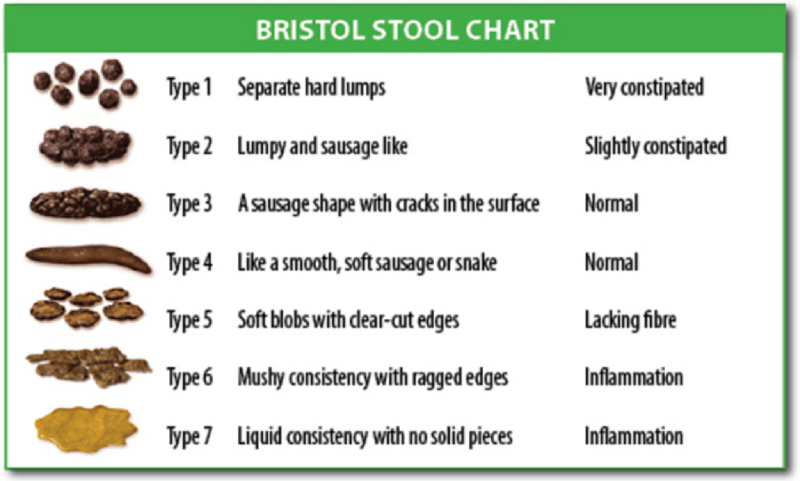Many people feel uncomfortable talking about their bowel habits, and I guess that's why there are so many euphemisms for it.
Have you ever built a dookie castle? Taken a dump? Done a number 2? Dropped the kids off at the pool? Chopped a log? Offloaded some freight? Visited Thomas Crapper?
Pooping is a private matter to most people (unless you’re a parent), but it still needs to be discussed and understood, because our bowel habits tell us a lot about our current health.
Poopy problems
The colour, texture, consistency and frequency of our stools (poop) tell us how our gut and organs are functioning.
The Bristol Stool Scale is a diagnostic chart that helps people classify, identify and diagnose problems.

The seven stool types range from constipation 1 & 2 to diarrhea 6 & 7. A well-formed ideal poop is around a 3 & 4.
CONSTIPATION
Constipation makes passing a stool difficult. It is hard and lumpy and may be painful to eliminate and can lead to haemorrhoids. Constipation can be caused by;
Dehydration
Poor liver function
Poor bowel and digestive function
Lack of fibre and poor diet
Lack of exercise
Stress
Pregnancy
Medication like pain killers, iron supplements & others
DIARRHEA
On the other end of the scale is diarrhea, which can interfere with quality of life due to the urgency of needing to eliminate.
Not having access to a toilet nearby can mean some pretty messy accidents, so journeys need to be carefully planned.
Diarrhea can lead to dehydration and poor absorption of nutrients and can be caused by;
Imbalance of gut bacteria
Parasites and unfriendly microbes
Food intolerances
Poor gut health (IBS)
Liver dysfunction
Inflammatory bowel disease (Crohn disease & ulcerative colitis)
Medications like antibiotics, antidepressants, acid reflux drugs & more.
COLOUR
The colour of a healthy stool is most often brown.
But our stools can change colour for a variety of reasons, and it's not always cause for concern.
Foods like cherries, beetroot, liquorice, green vegetables, flood colourings and irons supplements can cause a rainbow of reds, blacks and greens. Some medication like Pepto-Bismol can make stools appear light coloured.
But, colour change can also indicate problems.
RED: Can mean bleeding in the lower digestive tract
BLACK: Can be from bleeding in the upper digestive tract
PALE/ LIGHT / YELLOW: Excess fat due to malabsorption or insufficient bile
GREEN: Food moving though digestive system too fast, and bile is not broken down.
FREQUENCY
We eat food every day, so it makes sense we should be eliminating daily also.
When we eat, the muscles in our gut moves the food through our bodies which can also stimulate a bowel motion. Some people will have three well-formed poops a day after they eat, and others will have 1 or 2 and that’s ok too.
By using the Bristol Stool Chart, you can tell if they are healthy or not.
Unfortunately, some people think eliminating once a week is ‘normal’ because that is ‘regular’ for them. But once a week is not ok and indicates a major problem.
"I'm regular, I go every week"
Failing to pass a stool regularly means waste is left to build up and toxins are reabsorbed back into the body. This leads to a multitude of health problems including mood and anxiety disorders. (1)
The body will try to find other ways to eliminate waste and the skin often takes on this burden. This can result rashes, hives and skin inflammation.
WHAT’S AN IDEAL POOP?
- 1Brown colour (depending on diet)
- 2Good texture and consistency (3 to 4 on the Bristol Food Chart)
- 3Daily frequency
It’s a good habit to look at your poop regularly, so you can pick up any changes as they happen. Whilst it might make you squeamish, it’s worth the effort to get to know your body better.
My healing program focuses on foods and herbs that help support better bowel function and overall health. I can show you how to make number 2’s your number 1 priority.
Learn more here. Anti-Inflammatory Healing Program
